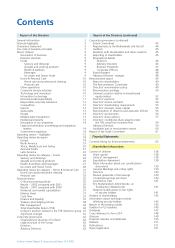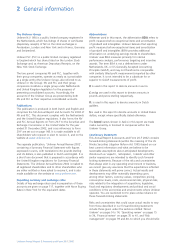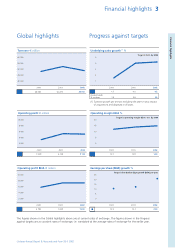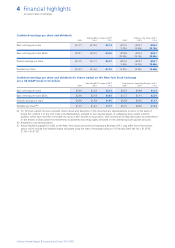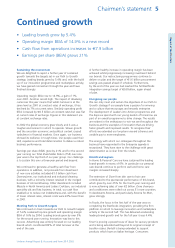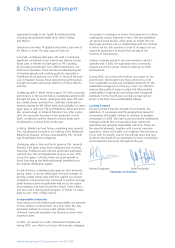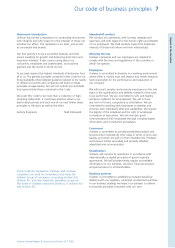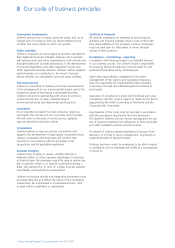Unilever 2002 Annual Report Download - page 14
Download and view the complete annual report
Please find page 14 of the 2002 Unilever annual report below. You can navigate through the pages in the report by either clicking on the pages listed below, or by using the keyword search tool below to find specific information within the annual report.
Unilever Annual Report & Accounts and Form 20-F 2002
Report of the Directors
About Unilever 11
Information technology
In 2002, we continued to direct our IT towards achieving
Unilever’s strategic objectives.
We further simplified business processes and core
transaction systems, building on our global partnership with
SAP. Through common information, processes and systems,
we are accelerating the move to regional businesses and
fully exploiting Unilever’s scale. With a light but disciplined
touch to what is made common at a global level, we are
making global synergies, while sharpening our focus on
customers and consumers both locally and regionally. The
simplification of our IT infrastructure enabled these changes
while reaping further benefits in cost savings, including the
signing of our largest ever telecommunications deal, with
BT. This telecommunications services contract sees us
reducing the number of suppliers around the world from
400 to one.
Our global data warehouse, successfully established this
year, is key to achieving common information across
Unilever and supporting our regional businesses. On this
foundation, we have built information systems to track
and manage Path to Growth achievement, with strategic
applications for the supply chain and brand and customer
development. In the financial arena, our financial,
management and brand reporting are being consolidated
into the same data warehouse, for completion in 2003.
These systems are providing Unilever with more
comprehensive, consistent and immediate information
than ever before.
We successfully piloted our global e-business gateway, the
Unilever Private Exchange. The gateway, which becomes
fully operational in 2003, strengthens our e-business
capability by providing secure links between our operating
companies and our suppliers’ and customers’ systems and
to external electronic marketplaces. The success of these
marketplaces and gateways is, of course, dependent on
industry standards for electronic information exchange.
Unilever demonstrated its commitment to industry standards
by co-chairing the Global Commerce Initiative, the world’s
largest advisory group for voluntary data standards. We are
working on an electronic catalogue of our products, based
on these standards, which will simplify ordering for retailers.
Some good examples of our exploitation of e-business
technology, building on the foundations established, include:
•branded websites and direct e-mail formed a fundamental
part of new relationship marketing programmes targeting
our most valuable consumers and supporting our global
brands;
•our Ariba online buying system enables purchases of non-
production items to be made at volume-negotiated prices
from selected suppliers. Almost 2 000 Unilever people are
now using Ariba in 24 countries;
•in our European Foods business, we linked our factory
systems with our strategic suppliers. This enables suppliers
to manage Unilever stock by looking into our systems to
check current stock levels;
•in India, we connected more than 1 000 stockists to our
systems, providing them with better stock control and
easier replenishment. This led to higher sales growth and
inventory savings for customers.
Environmental responsibility
Productive farmland, thriving fish stocks and clean water are
essential to our success. Our desire to protect them goes
hand in hand with a growing determination in society to
conserve the planet’s resources.
In 2002, we continued to work on reducing our
environmental impact while increasing production, and
measuring our performance against targets. The latest
data (for 2001) is available at www.unilever.com/
environmentsociety. We also reviewed and updated our
environmental strategy to achieve continued long-term
improvement in our environmental impact.
Around the world more and more people enjoy our foods.
We need to make our agricultural supply chain more
sustainable. Our sustainable agriculture programme achieved
its first target by completing the protocols for sustainable
management of all five key crops – palm oil, tea, peas,
spinach and tomatoes. All the protocols were agreed in
2002 with the Sustainable Agriculture Advisory Board. They
will shortly be published on www.growingforthefuture.com.
For the benefit of the environment, we are sharing this
knowledge of good agricultural practice and we have jointly
established an industry Sustainable Agriculture Initiative.
Our progress in agriculture is matched by our commitment
to sustainable fisheries. We bought more than a third of our
fish from sustainable sources, of which 6% was certified to
Marine Stewardship Council standards, including New
Zealand hoki. This represents good progress towards our
target of buying all fish from sustainable sources by 2005.
In Europe we continued to support the need for a more
sustainable fisheries policy.
Consumers need water to use our products, agriculture
needs it for irrigation and it is used by our factories. As part
of our global sustainability initiative, we extended our
partnership with Rhodes University in South Africa. The
Unilever Centre for Environmental Water Quality will
focus on improving water management and ensuring
the availability of clean, freshwater resources.


